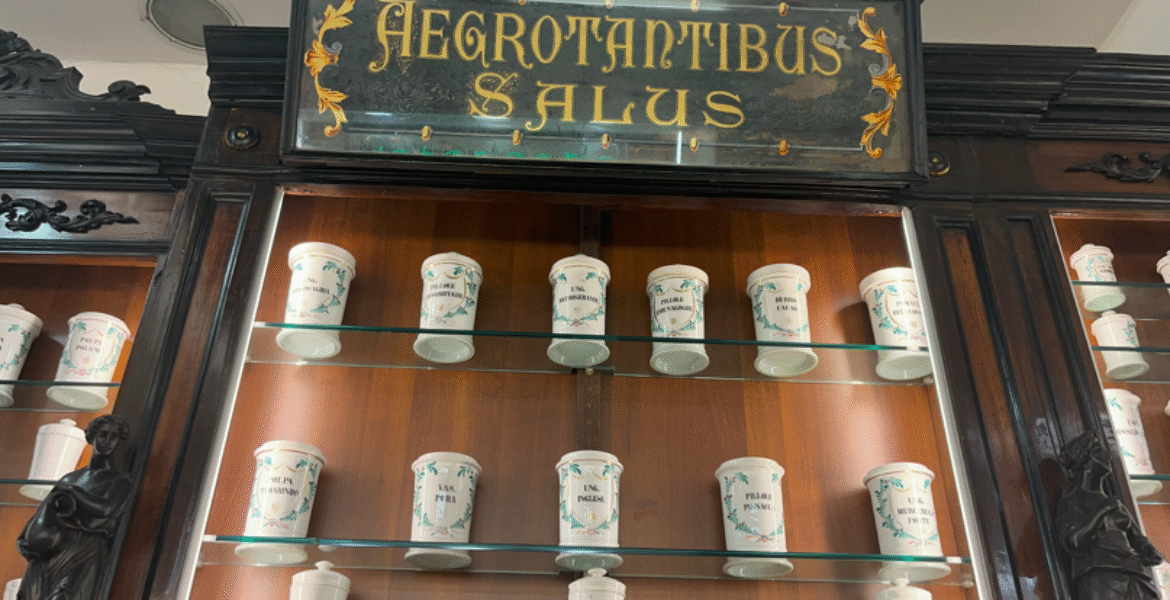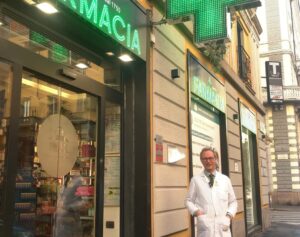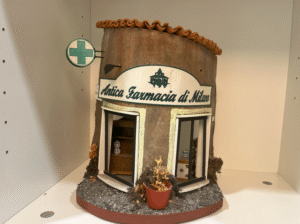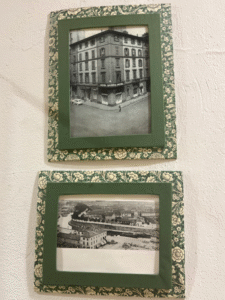
At 8:00 every morning, Fabio Moja opens the door of the Ancient pharmacy of Lazzaretto in Via Panfilo Castaldi 29, a corner of Milan that still retains the charm of the past. The inscription “Aegrotantibus salus” (“health to the sick”) adorns the entrance. He is not just a pharmacist but a custodian of a tradition rooted in the history of Milan.
It all starts with Manzoni

«Imagine, dear reader, the enclosure of the Lazzaretto, populated by sixteen thousand plague victims; that space crowded with huts and shacks, with carts, with people». Thus begins the thirty-fifth chapter of The Betrothed. Alessandro Manzoni described in his famous work a grim and somber place where people screamed, despaired, and died from the agonizing sufferings caused by the plague. «It was a hell on earth», wrote the author. Yet, even in the deepest darkness, a glimmer of light could be found: «the medicine depot». A small shop where «they prepared food for the convalescent, for the healthy attendants of the sick», a symbol of hope for many.
The history crosses Milan
Although Manzoni’s account was fictional, that pharmacy truly existed. And even today, after more than two and a half centuries, it continues its activity. Founded in 1750, the Antica Farmacia del Lazzaretto was the reference point of the eponymous neighborhood until the second half of the 1800s, when it moved to Porta Venezia, more precisely at the corner of Via Lecco and Via Castaldi. The pharmacy has distinguished itself from the beginning for the quality of service offered to customers and, above all, for its unique style. Indeed, the past is still palpable in the ebony inlaid furniture, all original from the 18th century, still laden with relics that tell of a profession and centuries-old wisdom.

As Fabio Moja, the owner of the pharmacy, recounts:«We wanted to keep part of the original furniture because it gives an important character to our pharmacy». Like the statuettes representing various arts and crafts that adorn the space. Or the scales and glass jars that were used until a few years ago. These latter contained all those substances for laboratory preparations, which were once made directly in the pharmacy. All framed by period photographs that restore the typical imagery of those years.
A family affair
Fabio Moja is retracing the footsteps of his ancestors: «I inherited this business from my father and my grandfather before him». He continues: «It’s very stimulating; we talk about pharmacy both at the table and during work moments». On the other hand, «managing the family business is difficult because it’s a responsibility I feel, a duty towards my relatives».

It was here, in the second half of the 20th century, that the Giuliani Medicinal Bitter was born. «My grandfather, together with Germano Giuliani, brought herbs into the pharmacy. They mixed them in large pots and created the bitter for their customers», explains Fabio Moja. It is a dietary supplement based on natural products, such as rhubarb and gentian, which help maintain intestinal balance, facilitate digestion, and treat occasional constipation. Due to its healing properties, «people liked it a lot», and that’s why «from there, a more important commercial activity developed», he recounts.
The celebrated pharmacy
The Ancient pharmacy of Lazzaretto boasts two awards: one for the oldest pharmacy in Milan and one for the oldest in Lombardy. But despite this success, the focus is always on the future. «Our future project is to continue on this path, trying to do our best every day», says Moja, in addition to frequently organizing events and meetings focused on health with specialists from various sectors.
Times change, the spirit remains
«Today, the activity has changed a lot. Bureaucracy, conditions, people, and Milan itself have changed. But» continues Moja, «being a neighborhood pharmacy, we have customers who are also historical, not so much by age but by frequenting the pharmacy». Thus, today, the Antica Farmacia del Lazzaretto continues to be a point of reference for the area, just as it was in the pages of Alessandro Manzoni.
